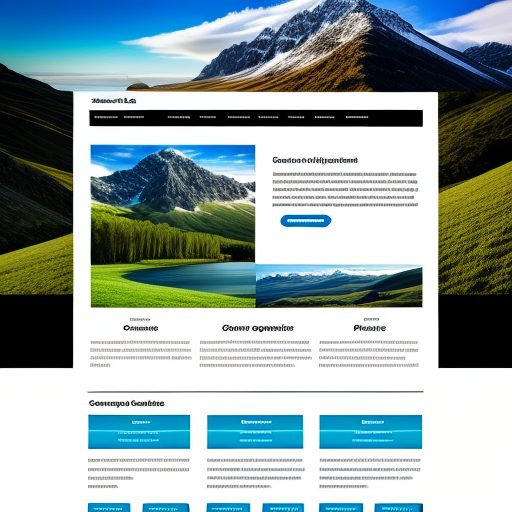
How to Launch Your Website: A Step-by-Step Guide
Launching a new website is and exciting milestone for any business, but it can also feel overwhelming. Whether you’re building a site from scratch or redesigning an existing one, a successful launch requires careful planning and preparation.
In this guide, we’ll walk you through the key steps you need to take to ensure a smooth and successful website launch.
1. Finalize Your Website Design and Content
Before your website goes live, ensure that all design elements and content are complete. Double-check that your website’s layout, colors, fonts, and overall design are consistent with your brand identity. Every page should be visually appealing and easy to navigate.
Key tasks to complete:
- Check content for accuracy: Proofread all text for spelling, grammar, and clarity. Make sure your messaging aligns with your brand.
- Ensure consistency: Make sure that fonts, colors, logos, and visuals are consistent across all pages.
- Test internal links: Verify that all internal links are functional and direct users to the appropriate pages.
- Complete meta descriptions: Ensure each page has an SEO-friendly meta description and title tag.
2. Set Up Analytics and Tracking
To measure your website’s performance from day one, it’s essential to set up analytics tools like Google Analytics. This will allow you to track important metrics such as page views, traffic sources, and user behavior. Monitoring these metrics helps you understand what’s working and where improvements are needed.
Steps to follow:
- Install Google Analytics: Set up a Google Analytics account and add the tracking code to your website.
- Set up goals: Define goals such as contact form submissions, downloads, or purchases to track conversions.
- Enable Google Search Console: Submit your site to Google Search Console to monitor how your website performs in search results and identify potential issues.
3. Optimize for SEO
Search engine optimization (SEO) is crucial for ensuring that your website ranks well in search engine results. Before launching, make sure your website is optimized to be easily found by search engines like Google. This will help drive organic traffic to your site.
Key SEO tasks:
- Use relevant keywords: Make sure your content is optimized for relevant keywords related to your business.
- Optimize title tags and meta descriptions: Each page should have unique and compelling title tags and meta descriptions.
- Use alt text for images: Ensure that all images on your website have descriptive alt text to improve accessibility and SEO.
- Check URL structure: Use clean, readable URLs that include relevant keywords.
4. Test Website Functionality Across Devices
Your website should offer a seamless experience for users across all devices—desktops, tablets, and mobile phones. Testing your site on different screen sizes ensures that it’s fully responsive and user-friendly.
Things to test:
- Mobile responsiveness: Ensure that all elements, including buttons and navigation menus, display correctly on mobile devices.
- Browser compatibility: Test your website on different browsers like Chrome, Firefox, Safari, and Edge to confirm that it works well across platforms.
- Page load speed: Use tools like Google PageSpeed Insights to check your website’s load time. A fast website enhances user experience and improves SEO.
5. Secure Your Website with an SSL Certificate
An SSL certificate is essential for securing your website and protecting user data. SSL encrypts the data transferred between your website and your users, ensuring that sensitive information like passwords and credit card details are safe from hackers.
Why SSL is important:
- Builds trust: Websites with SSL display the padlock symbol and “HTTPS” in the URL, signaling to visitors that the site is secure.
- Improves SEO: Google favors secure websites in search rankings, so having an SSL certificate can positively impact your SEO efforts.
- Required for ecommerce: If your website processes payments, an SSL certificate is a must to protect sensitive financial data.
6. Set Up a Backup and Maintenance Plan
Once your website is live, it’s important to regularly back up your data and ensure that your website is properly maintained. Backups help protect your website from data loss due to technical issues, while regular maintenance keeps your website secure and running smoothly.
Steps to take:
- Set up automatic backups: Schedule regular backups of your website’s data to prevent any loss of information in case of technical issues.
- Update plugins and themes: Keep your WordPress plugins, themes, and software updated to the latest versions for optimal performance and security.
- Monitor for downtime: Use tools to monitor your website’s uptime and ensure it’s always accessible to users.
7. Test All Forms and Integrations
Before launch, it’s crucial to test any forms or third-party integrations on your website to ensure they are functioning correctly. This includes contact forms, payment gateways, and newsletter sign-up forms.
Checklist for testing:
- Contact forms: Submit test forms to ensure they are working and that you receive the entries.
- Ecommerce functionality: If you have an online store, place test orders to verify that the payment and order processing systems are functioning properly.
- Third-party integrations: Check that all third-party tools, such as email marketing integrations and CRM systems, are working as expected.
8. Launch Your Website
Once all tests have been completed and you’re confident that everything is in place, it’s time to launch! Announce your website launch on social media, send out an email to your subscribers, and celebrate your new online presence.
Launch Your Website with Confidence with B_Limitless
At B_Limitless, we help businesses through every step of the website launch process, ensuring that your site is secure, optimized, and ready to impress. From development and SEO to security and ongoing maintenance, we’ve got you covered.
Contact us today to launch your website with confidence!





